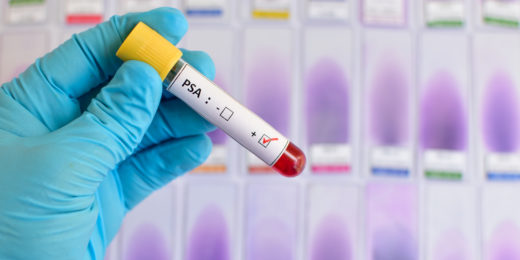You may have noticed more facial hair on the men around you lately. This month, groups like No-Shave November and the Movember Foundation are promoting men's health awareness through conversation-sparking mustaches and beards. In this spirit, I spoke with Stanford urologist James Brooks, MD, to learn more about an important -- but hotly-debated -- diagnostic for prostate cancer: the PSA test.
What is the PSA test?
It's a blood test that measures a protein called prostate-specific antigen, or PSA, made by the prostate gland. PSA is a protein made only by the prostate gland and created at high levels in the ejaculate. In the mid to late 1980s, some large studies showed that an elevated PSA indicates a higher risk of having prostate cancer. That led to the FDA approving the testing of PSA levels as a diagnostic for prostate cancer in 1994.
Who should be getting the PSA test?
Right now, screening guidelines from the US Preventive Services Task Force are that men of average risk who are age 55 through age 69 should be getting PSA tests. There's some dispute, however, about how often: Some guidelines suggest once a year, others suggest every other year. If men have an increased risk for prostate cancer -- such as having a family history of prostate cancer or being African American -- they should probably start getting tested at age 50 and have it yearly thereafter.
Are there behaviors that increase the risk for prostate cancer?
Being trim and staying physically active reduce your risk. Eating more animal products, in particular red meat and dairy, has been associated with an increased risk of getting prostate cancer.
Can you describe the ongoing controversy about the PSA test?
The problem is it's prostate-specific antigen, not prostate-cancer-specific antigen. And that's what's gotten us into trouble -- a high PSA level doesn't necessarily mean that someone will have prostate cancer. For example, an enlarged or inflamed prostate can result in a high PSA level.
In the United States, when we did wholesale screening of the male population, without regard to age or risk, we identified a lot of guys with prostate cancer based on their test results. A few things happened that were good. First, the number of men presenting with metastatic prostate cancer dropped dramatically in the 1990s and 2000s. Second, the number of men dying of prostate cancer also dropped dramatically.
But we overdid it. As you screen men, the sizes and grades of prostate cancers found goes down and you start finding cancers that will never bother men. We've known for a long time that if you look at the prostates of men who die of other causes, you can find what pathologists would call prostate cancer in a startling number of men, even in their 40s.
Some studies have shown for men at age 80, anywhere between 70 and 100% have some cancer cells in their prostates. This means that there are many men found by PSA testing who have small low grade cancers they will die with, rather than from.
In the last decade or two, we've started to recognize that we're doing too much: Treatments have consequences. Surgery and radiation therapy, the two mainstays for cancer confined to the prostate, can affect both sexual and urinary function. If you operate on men, almost all men will have some urinary incontinence, or leakage of urine, after surgery and some will have it permanently.
Is the problem that positive PSA test results are challenging to interpret?
That's right. Issue number one is getting false positives -- and that happens a lot. For men with a high PSA, in the 4 ng/mL to 10 ng/mL range, we find cancer in about 25% of cases when we do a biopsy. That means there are a whole lot of guys who got a biopsy of their prostate that didn't need to. About 2% to 5% of men will get a urinary tract infection related to a biopsy, so false positives have real consequences.
In addition, if you operate on every man diagnosed with prostate cancer, including these low-risk guys, you're way overdoing it.
Should men keep getting tested then, given these issues?
The US Preventive Services Task Force gave the test a "C" rating in 2017 following a large study of 160,000 men where researchers found that if you get PSA testing, it drops your risk of dying of prostate cancer 10 years later by 20%.
This rating means you should talk to your doctor about the risks and benefits of PSA testing and decide, with your doctor, whether you need PSA testing.
Photo by StockSnap






